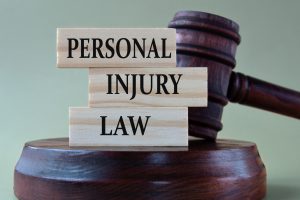Whether it's a car collision, a slip, a fall, a workplace incident, or any other type of accident, knowing how to respond immediately is crucial for your well-being and potential legal actions. This article outlines a comprehensive guide listing essential steps you should take after getting injured in an accident. Following these steps can protect your health, rights, and future.
Consult with an Attorney
Personal injury attorneys will advise you that your safety should be your primary concern in the chaotic aftermath of an accident. Depending on the nature of the accident, take necessary measures to move to a safe location and prevent further harm. If you're involved in a car crash, move your vehicle to the side of the road and turn on hazard lights. In cases of workplace accidents, follow emergency protocols and evacuate if necessary. Prioritizing safety ensures you're not exposed to additional risks while waiting for help.
Also, remember that legal representation can significantly impact the outcome of your case. Consult an experienced personal injury legal practitioner as soon as possible. A knowledgeable attorney can provide you with expert guidance, evaluate the merits of your case, and help you navigate the complexities of the legal system. They can advise you on the best action and protect your rights. According to legal practitioners from reputable accident law firms, navigating the intricate legal landscape, especially in the aftermath of a mishap, can be overwhelming and confusing. This is where a personal injury attorney truly shines. They possess an in-depth understanding of the complexities of the legal system and can effectively guide you through every step of the process.
Finding the right lawyer is crucial to ensure you receive the best legal representation and maximize your chances of the best outcome. Here are some tips to help you find the perfect personal injury attorney for your case:
#1 - Experience Matters: Look for an attorney who specializes in personal injury law. Experience in handling similar cases can give them insights into the nuances of personal injury claims and the strategies needed for success. Ensure the lawyer is licensed, in good standing with the state bar association. You can verify this information on the state bar association's website.
#2 - Ask for Recommendations: Seek recommendations from your friends and family members, or colleagues who have been through a similar situation. Personal referrals provide valuable insights into an attorney's competence and professionalism. Use online resources to research personal injury attorneys in your area. Read reviews, testimonials, and case results to gauge the attorney's reputation and track record. Request references from past clients who can provide insights into their experience working with the attorney.
#3 - Specialization: While personal injury is a specialized area of law, some attorneys may have additional expertise in specific accidents or injuries. Look for an attorney whose specialization aligns with your case. Inquire about the attorney's track record of successful settlements and verdicts. A strong history of favorable outcomes demonstrates their ability to handle complex cases effectively.
#4 - Initial Consultation: Many personal injury legal practitioners offer free initial consultations. Take advantage of these consultations to discuss your case, assess the attorney's communication style, and determine if you feel comfortable working with them. Effective communication is essential throughout your case. Choose an attorney who is attentive, responsive, and willing to keep you informed about the progress of your case.
#5 - Fee Structure and Resources: Personal injury attorneys typically work on a contingency fee basis, which means they only get their payment if you win your case. Note the fee structure and any additional costs during your initial consultation. Personal injury cases often require substantial resources for investigations, expert witnesses, and more. Make sure the attorney has the necessary resources to build a robust case on your behalf. An attorney familiar with local courts, judges, and legal practices can give you a strategic advantage when pursuing your case.
#6 - Trial Experience: While most personal injury cases are settled outside of court, having an attorney with trial experience can be beneficial if your case goes to court. Trial-tested attorneys are often more confident negotiators. Research the legal practitioner's reputation within the legal community. A respected attorney may have established relationships that could positively impact your case. Confirm that the attorney adheres to ethical guidelines and has a clean disciplinary record.
#7 - Availability: Ensure the attorney has the time and availability to dedicate to your case. A busy attorney may struggle to provide the attention your case deserves. Trust your instincts. Choose an attorney with whom you feel comfortable sharing personal details and who demonstrates genuine concern for your well-being. Choose an attorney near you for easy communication and accessibility.
Remember that finding the right personal injury attorney may take time, but it's a crucial investment in securing just compensation for your injuries and losses.
Seek Medical Attention Immediately
Your health is paramount. Even if you believe your injuries are minor, seeking medical attention promptly is essential. Some injuries may not manifest symptoms right away, and a delay in treatment could worsen your condition. Visit a healthcare professional, urgent care center, or hospital for a thorough evaluation. Medical records from this visit will be crucial if you pursue a personal injury claim later. Additionally, prompt medical attention ensures proper diagnosis and treatment, establishing a clear link between the accident and your injuries. This documentation is pivotal in building a solid compensation case and demonstrates your commitment to well-being and recovery.
Document the Scene
Preserving evidence is vital for building a solid case. If you're physically able, document the accident scene by taking photographs or videos. Capture vehicle positions, property damage, road conditions, weather, and relevant landmarks. In non-vehicular accidents, document the hazardous condition that led to the incident. These visual records can serve as decisive evidence to establish liability and the accident's circumstances. Here are some tips to effectively document the accident scene:
#1 - Photographs and Videos: Take clear, detailed pictures and videos of the accident scene from multiple angles. Capture wide shots to show the overall context and close-ups to highlight specific details, damages, and relevant landmarks. Document the final positions of vehicles involved in the accident. This can help recreate the sequence of events leading up to the collision. Ensure your camera or smartphone settings include the time and date stamp on each photo or video. This helps establish when the images were taken.
#2 - Capture Surroundings: Include photographs of traffic signs, signals, road conditions, weather conditions, and lighting. These details can provide context and help establish factors that may have contributed to the accident. If it's a vehicular accident, capture any skid marks, debris on the road, or damage to surrounding objects. These can provide insights into the speed, direction, and force of impact. Take photographs of the road layout, lane markings, intersections, and relevant traffic signs or signals. These images can clarify how the accident occurred and who had the right of way.
#3 - Injuries: Document any visible injuries sustained by you or others involved in the accident—photograph injuries from different angles and distances to depict their severity accurately. If your injuries prevent you from documenting the scene immediately, you can return to the location once you're able or ask a trusted friend or family member to do so on your behalf.
#4 - Vehicle and Property Damage: If applicable, take pictures of the vehicles involved, including license plates, vehicle identification numbers (VINs), and damages—document property damage to structures, fences, or other objects affected by the accident. Place a recognizable thing, such as a coin or a ruler, next to damages or injuries to provide a sense of scale in your photographs.
#5 - Weather Conditions: Record weather conditions at the time of the accident, including visibility, rain, snow, fog, or any other factors that could have contributed to the incident. While documenting the scene, prioritize your safety and the safety of others. Avoid obstructing traffic or putting yourself in dangerous situations.
#6 - Capture Interactions: If the other party admits fault or makes any statements, try to document these interactions. However, do not engage in confrontations or arguments. If witnesses are at the scene, consider taking photos of their location and obtaining their contact information. Witness statements can be crucial for corroborating your account of the accident. Use your smartphone to record voice notes describing the accident scene, observations, and other relevant details. These notes can complement your visual documentation.
By following these tips and capturing thorough and accurate documentation of the accident scene, you can provide valuable evidence that strengthens your case and supports your personal injury claim.
Report the Incident and Preserve Physical Evidence
In addition to photographs, preserving any physical evidence of the accident is essential. This could include damaged personal property, torn clothing, or any objects that played a role in the incident. These items can be tangible proof of the accident and its impact on your life. Depending on the type of accident, report it to the appropriate authorities. For car accidents, contact law enforcement and file a police report. If the incident occurred at your workplace, immediately inform your supervisor or manager and complete an incident report. Reporting the accident helps create an official record and establishes a timeline of events.
In cases of accidents occurring on public property or involving potential hazards, consider reporting the incident to relevant agencies such as local authorities or regulatory bodies. By doing so, you contribute to public safety awareness and provide additional documentation that can strengthen your case should legal action be necessary. Remember, a well-documented and reported incident enhances the credibility of your claims and supports the process of seeking fair compensation for your injuries and losses.
Gather Information and Keep Detailed Records
Exchange contact, insurance, and vehicle details with other parties involved in the accident. Obtain names, phone numbers, addresses, license plate numbers, and insurance information. Additionally, gather contact information from any witnesses present at the scene. Witness testimony can provide crucial insights and corroborate your events, strengthening your claim.
After collecting this information, it's advisable to jot down your account of the accident while the details are fresh in your memory. Note the sequence of events, any statements made by the parties involved, and any additional observations that might be relevant. This written record can serve as a valuable reference when discussing your case with your attorney and navigating the legal process.
Maintain a comprehensive record of all aspects related to the accident and your injuries. This includes medical records, treatment plans, prescriptions, and receipts for any out-of-pocket expenses. Document the impact of the injuries on your daily life, including missed workdays, activities you can no longer participate in, and emotional distress. These records will be invaluable when quantifying your damages and negotiating a fair settlement.
Notify Your Insurance Company
If the accident involves an insurance claim, promptly notify your insurance company. Provide them with accurate and detailed information about the accident, your injuries, and any other relevant details. Cooperate fully with your insurer while being cautious about sharing information that could be used against you in the claims process.
While it's essential to cooperate with your own insurance company, exercise caution when communicating with the other party's insurance. Avoid providing recorded statements or signing documents without consulting your attorney first. Insurance adjusters may attempt to elicit information that could be used to diminish your claim. Your attorney will ensure that you communicate effectively and protect your best interests.
Consider Mediation or Negotiation
Before pursuing a formal lawsuit, explore the option of mediation or negotiation. These alternative dispute resolution methods can lead to a quicker resolution and reduce legal costs. Your attorney can represent your interests during these proceedings and work toward a fair settlement that compensates you for your injuries and losses.
Know Your Statute of Limitations
Each state has a statute of limitations that sets a time limit for filing a personal injury claim. Being aware of these deadlines is crucial, as missing them could result in the forfeiture of your right to seek compensation. Your attorney will ensure you meet all necessary filing deadlines and take timely action to protect your claim.

Experiencing an accident and subsequent injuries can be overwhelming, but taking the proper steps in the aftermath is crucial for your physical, emotional, and financial well-being. By prioritizing safety, seeking medical attention, documenting the scene, gathering information, and enlisting legal representation, you set the foundation for a successful personal injury claim. Remember, your actions in the immediate aftermath can significantly impact your ability to secure fair compensation for your injuries and losses. These steps can empower you to navigate the challenges and work toward a brighter future.





















